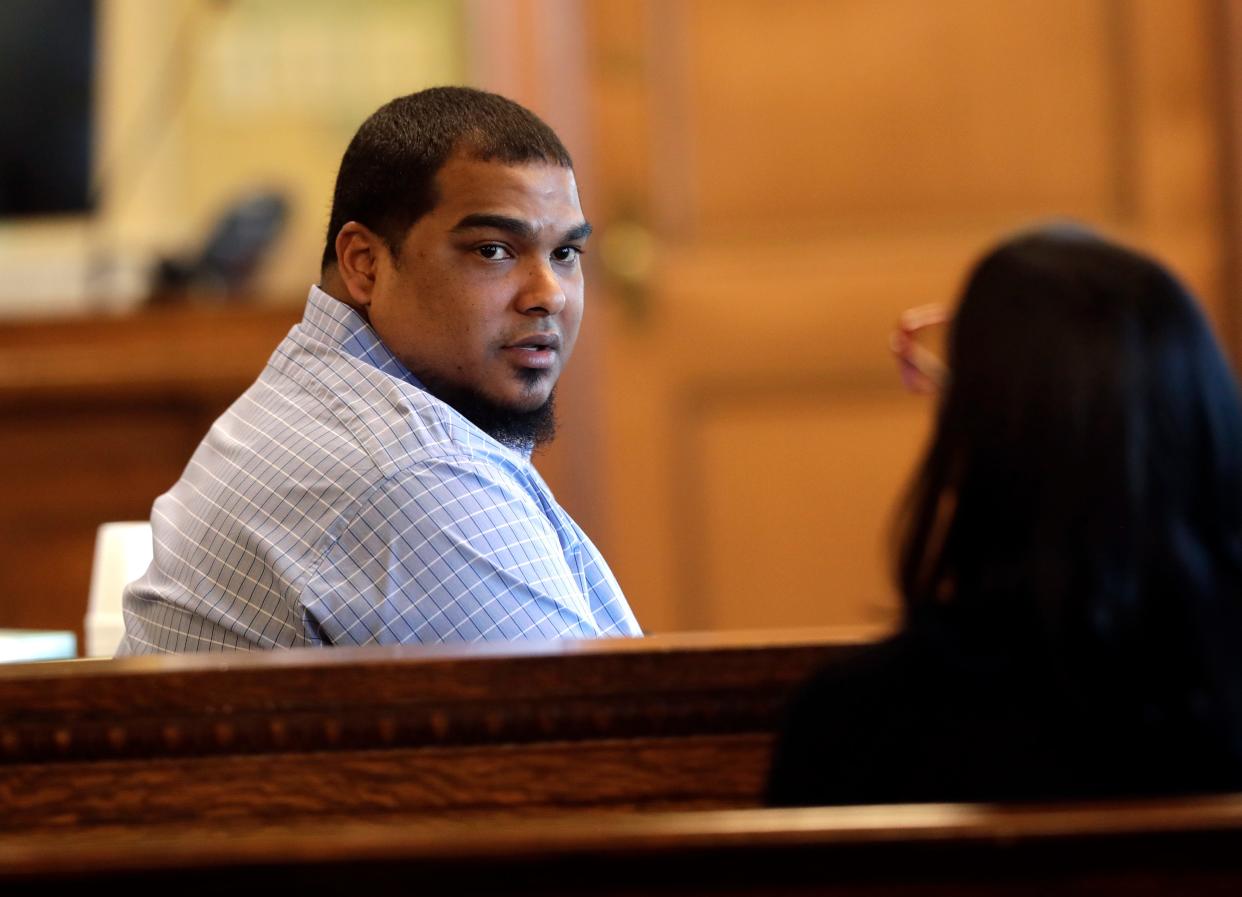Green Bay man sentenced to life in prison for homicide, mutilating a corpse in 2021 case

GREEN BAY – A Green Bay man convicted of killing a 36-year-old Ashwaubenon man and ordering the burning of his body was sentenced Tuesday to life in prison with the possibility of release on extended supervision in 41 years.
Pedro Santiago-Marquez, 34, was found guilty of killing Jason Mendez-Ramos and mutilating his corpse, as party to a crime, in March after a three-day jury trial.
In Wisconsin law, first-degree intentional homicide carries a mandatory life sentence, with discretion for a judge to determine if and when a person convicted of that crime is eligible for parole. At Santiago-Marquez's sentencing hearing, Brown County Circuit Court Reserve Judge William Atkinson set a parole eligibility date of July 19, 2064.

Atkinson also sentenced Santiago-Marquez to 10 years for the mutilating a corpse charge, to be served concurrently to his life sentence.
Santiago-Marquez owned both Empire Painting and a towing company, which operated out of a shop at 1638 E. Mason St. in Green Bay. A jury determined that on Sept. 27, 2021, Santiago-Marquez shot, or ordered the shooting, of Mendez-Ramos at the shop. Later that day, he ordered the burning of Mendez-Ramos' body, which was found on the northeast corner of Cofrin Memorial Arboretum in the early morning hours of Sept. 28, 2021.
Investigators say Santiago-Marquez owed Mendez-Ramos money related to drug trafficking, but Atkinson limited how much of this information was able to be brought up in court. Evidence was presented at trial that Santiago-Marquez owed money to many of his employees for their work.
Santiago-Marquez continued to maintain his innocence at the sentencing hearing. He said Mendez-Ramos was his "best friend" and that he feels for Mendez-Ramos' family, but that he did not kill him.
"I'm saying this in front of my family ... they know that I'm innocent and the type of person that I am," Santiago-Marquez said Tuesday through a translator.
Mendez-Ramos' father and aunt both made victim impact statements, describing to the judge the hardship their family faced due to Mendez-Ramos' death and requesting justice.
Santiago-Marquez's mother took the stand to attest to her son's character. She said Santiago-Marquez has been a hard worker his entire life, and since immigrating to the United States from Puerto Rico, he learned multiple trades, made money for his his own family to move and helped other families find jobs and settle in the country.
Assistant District Attorney Kimberly Hardtke requested Atkinson sentence Santiago-Marquez to life in prison without the possibility of parole.
Santiago-Marquez's attorney, Heather Lynn Richmond, requested that Atkinson grant Santiago-Marquez eligibility for an extended release date, but did not specify after how many years in prison she was requesting.
Hardke said that while they don't know for certain that it was Santiago-Marquez who pulled the trigger, the jury heard the evidence and determined Santiago-Marquez was guilty as party to a crime of causing Mendez-Ramos' death.
"This was a case where this was clearly an intentional act. The victim was shot three times — once in the back of the head, once in the back, once in the torso. His body was wrapped in a plastic tarp, taken to a remote area and lit on fire," Hardtke said. "The defendant used many other people — and you heard this testimony during the course of the trial — to cover up or to attempt to cover up what happened and to divert attention away from himself."
Two other men have been convicted in connection with helping dispose evidence of the murder.
While delivering his sentence, Atikinson noted Santiago-Marquez's lack of a prior criminal record.
"I don't think I've had a first-degree homicide case in my 28 years on the bench where the defendant had no prior criminal record," Atkinson said.
Still, he said, first-degree intentional homicide is the most serious crime in Wisconsin and requires a serious sentence.
"I believe the jury. I understand the positives in your life, but it didn't stop you on that day from murdering Mr. Mendez-Ramos," Atkinson told Santiago-Marquez. "It might have been a short lapse in character, I don't know, maybe you were planning it for a long time ... but it was a catastrophic decision you made. A decision that cost Jason's life, and a decision that will affect his family members for the rest of their lives."
RELATED: Brown County jury finds Pedro Santiago-Marquez guilty of killing Ashwaubenon man
RELATED: 2 men convicted in connection with 2021 homicide of Ashwaubenon man
Contact Kelli Arseneau at (920) 213-3721 or karseneau@gannett.com. Follow her on Twitter at @ArseneauKelli.
This article originally appeared on Green Bay Press-Gazette: Green Bay man sentenced to life in prison for homicide in 2021 case

